2019 浙江杭州师范大学综合英语考研真题
I.Cloze(每小题 1 分,共 30 分)
Fill in the blanks with a function word.
One of the greatest advances in modern technology has been the invention of computers.
They are already widely used in industry and in universities and the time may come
when it will be possible ______ (1) ordinary people to use them as well. Computers
are capable of doing extremely complicated work in all branches of learning. They
can solve the most complex mathematical problems or put thousands of unrelated facts
in order. These machines can be put ______ (2) varied uses. For instance, they can
provide information ______ (3) the best way ______ (4) prevent traffic accidents,
or they can count the number ______ (5) times the word 'and' has been used ______
(6) the Bible. Because they work accurately and ______ (7) high speeds, they save
research workers years of hard work. This whole process ______ (8) which machines
can be used to work ______ (9) us has been called automation. In the future,
automation may enable human beings ______ (10) enjoy far more leisure than they do
today. The coming of automation is bound ______ (11) have important social
consequences.
Some time ago an expert on automation, Sir Leon Bagrit, pointed out that it was a
mistake to believe that these machines could 'think'. There is no possibility that
human beings will be 'controlled ______ (12) machines'. Though computers are capable
of learning______ (13) their mistakes and improving on their performance they need
detailed instructions ______ (14) human beings in order to be able to operate. They
can never, as it were, lead independent lives, or 'rule the world' ______ (15) making
decisions ______ (16) their own.
Sir Leon said that in the future, computers would be developed which would be small
enough to carry ______ (17) the pocket. Ordinary people would then be able to use
them to obtain valuable information. Computers could be plugged ______ (18) a
national network and ______ (19) used like radios. For instance, people going on
holiday could be informed about weather conditions; car drivers could be given
alternative routes when there are traffic jams. It will also be possible to make
tiny translating machines. This will enable people who do not share a common language
to talk ______ (20) each other ______ (21) any difficulty or to read foreign
publications. It is impossible to assess the importance ______ (22) a machine of
this sort, for many international misunderstandings are caused simply through our
failure ______ (23) understand each other. Computers will also be used in hospitals.
______ (24) providing a machine ______ (25) a patient's symptoms, a doctor will be
able to diagnose the nature of his illness. Similarly, machines could be used to
keep a check ______ (26) a patient's health record and bring it up to date. Doctors
will therefore have immediate access ______ (27) a great many facts which will help
them in their work. Book-keepers and accountants, too, could be relieved______ (28)
dull clerical work, for the tedious task of compiling and checking lists of figures
could be done entirely ______ (29) machines. Computers are the most efficient
�
servants man has ever had and there is no limit ______ (30) the way they can be used
to improve our lives.
II. Reading Comprehension(每小题 2 分,共 60 分)
There are 6 passages in this section. Each passage is followed by some questions
or unfinished statements. For each of them there are four choices marked A), B),
C), and D). You should decide on the best choice and write the corresponding letter
on the answer sheet.
Passage 1
Alan Brooker and Loren Teague are authors who have a book due out soon. You probably
won’t find their titles on the shelves of your local bookstore. Their prose is
published in computerized, digital bits. They are authors publishing e-books (short
for “electronic books” or books published only on the Internet, and not in paper
form).
They’re not getting big fat advances from publishers. Not even a small cheque.
Instead, Brooker will get 35 percent of each e-book sold, and Teague will get 30
percent. That’s way above what either could expect in royalties if their titles
were published in the familiar format, as beautifully bound bits of trees.
The usual author royalty is anyway between ten and fifteen percent of a book’s
selling price. But the large percentage royalty for an e-book will come from a much
smaller price — e-books sell online for somewhere between $2.50 and $7 a copy,
compared to the bookstore retail price of between $US 10 and $90 depending on the
size and quality of the publication.
But how many e-book copies can the authors expect to sell in an electronic market
which is still in its infancy? The best-selling e-author of 1999, Leta Nolan Childers,
sold just over 6,000 copies of her book The Best Laid Plans. “I’m expecting to
sell more than I would in the traditional local market, simply because the US market
is so much bigger,” says Teague, whose novel, Jagged Greenstone, was runner-up in
the UK Romantic Novelists Association New Writers Award.
Email, e-commerce, e-authors, e-books, eeeargh! The whole world is on a
technological treadmill. Surely not books? The pleasure of reading isn’t just in
the way it allows escape into other worlds. Physical books are a tactile, visual
experience. There’s nothing like the anticipation of a new book in your hands, the
appeal of a cover, and the smell of ink and paper, not to mention a small frisson
of guilt at all those murdered trees. You can curl up in an armchair, or in bed,
with a good book. But surely it will not be the same with a small electronic device,
even if it is the size of a paperback and the weight of a hardback, and has a small
button that turns the page.
Even if you like the idea, you first have to have Softbook and the Rocket e-book
— hand-held electronic readers with high resolution screens, the ability to store
several books at once, but unless you have the small reading devices, that means
reading books on a large computer screen, and that definitely doesn’t lend itself
to a late-night reading experience in bed.
So far, those are the two forums for e-publishing, a field still the focus of the
�
technologically infatuated. Teague still meets responses such as that of the
librarian in her home town of Nelson. “When I told her about them (e-books), she
just looked at me blankly,” says Teague, laughing. Or the response of the unnamed
executive from a top publishing house who said of e-book publishing: “Isn’t that
for failed authors?”
But the Bigs are moving in. Fatbrain.com, which has partnered with Adobe, will let
anyone sell digital books on its website and is negotiating with publishers such
as Macmillan and McGraw-Hill to find new ways of packaging their titles. Best-selling
authors like mystery thriller writers Patricia Cornwell and Jonathan Kelleman are
now posting electronic titles on the Internet. The website www. originalsonline.com
also displays only e-books that have never been published in paper form.
Recently, top-selling horror story author Stephen King wrote and published his first
e-book, Riding the Bullet, a 66page “ghost-story in the grand manner”. It was
published only on the Internet on the website of American publishers Simon & Schuster
who charged visitors $2.50 to download it. In the first week, 450,000 people visited
the site, before other sites copied it and made it available without charge — it’s
typical of the Internet, that something will always be copied for free.
Computer giant Microsoft and leading US bookstore chain barnesandnoble.com now plan
to create a giant e-bookstore. Microsoft is also leading a push to standardize
formats for online books to allow them to be downloaded to any computer. Steve Riggio,
vice chairman of Barnes and Noble, can see a time in the near future when there will
be an electronic version of virtually every book in print.
For unknown authors, e-books offer a better chance to get published. Fatbrain allows
any would-be author to store a manuscript online for just $1 a month. For publishers,
it could mean a whole new headache because already established authors could cut
out the middleman and release titles straight to their audience, although there will
still be a role for the publishing houses in editing and marketing.
Small book publisher Hazard Press, however, is excited by the possibilities.
Managing director Quentin Wilson believes that it will be especially invaluable for
selling the company’s back catalogue because it won’t require a print run of
thousands just a quick electronic format.
With the kind of heavyweights now backing e-publishing, it’s a matter of when, not
if, the phenomenon rolls into town. Does it mean the death of books as we now know
them? What happens when electronic readers are as cheap as dirt, or when media
conglomerates give them away to help to sell their vast archives of material? Would
you rather pack a box of discs next time you move to a new house, instead of seemingly
endless cartons of books? There is still a romance to books that it’s hard to see
their electronic cousins replacing.
“I don’t think we’ve reached anything like the version of e-books that will
probably come about within a year,” says Wilson. “And I don’t see the actual
physical book disappearing. But I do see the future including the downloading of
a particular book in a formatted file of some kind. It’s inevitable.”
In the way that horses remained after the advent of the car, books won’t
disappear entirely for book lovers. They will simply become a new form of recreation.
�
“Nothing beats a beautifully produced book,” says Wilson.
C. 10 times.
B. 4 to over 10 times.
1. You are not likely to find Alan Brooker and Loran Teague’s forth-coming book
on the shelves of a bookstore because ______.
A. all the copies are out of stock
B. all the copies are sold out
C. their work has not aroused readers’ interest
D. their work is not published in the traditional way
2. According to the author, how many times of money can a copy of a book make in
the traditional print compared with the computerized version?
A. 2 to 3 times.
D. 90 times.
3.Which of the following is obviously NOT in agreement with the author’s idea of
what readers can enjoy when reading paper books?
A. The fascinating cover
B. The aromatic smell of ink and paper
C. Curling up in an armchair or lying in bed
D. A miraculous sense of delight at changing wood into paper
4.If a publisher would like to put out some books of enigma and excitement, it is
most likely to contact ______.
A. Patricia Cornwell and Jonathan Kelleman
B. Alan Brooker and Loren Teague
C. Stephen King
D. Quentin Wilson
5. The concluding remark of the passage fully demonstrates a publisher’s confidence
that ______.
A. e-books will dominate readership
B. traditional books will disappear entirely
C. books will continue on condition that they are of good quality
D. books will be good-looking
Passage 2
The first thing I want to insist on is that reading should be enjoyable. Of course,
there are many books that we all have to read, either to pass examinations or to
acquire information, from which it is impossible to extract enjoyment. We are reading
them for instruction, and the best we can hope is that our need for it will enable
us to get through them without tedium. Such books we read with resignation rather
than with alacrity. But that is not the sort of reading I have in mind. The books
I shall mention in due course will help you neither to get a degree nor to earn your
living. They will not teach you to sail a boat or get a stalled motor to run, but
they will help you to live more fully. That, however, they cannot do unless you enjoy
reading them.
The “you” I address is the adult whose avocations give him certain leisure
and who would like to read the books which can without loss be left unread. I do
not address the bookworm. He can find his own way. I wish to deal only with the
masterpieces which the consensus of opinion for a long time has accepted as supreme.
�
We are all supposed to have read them; it is a pity that so few of us have. But there
are masterpieces which are acknowledged to be such by all the best critics and to
which the historians of literature devote considerable space, yet which no ordinary
person can now read with enjoyment. They are important to the students, but changing
times and changing tastes have robbed them of their savour and it is hard to read
them now without an effort of will. Let me give one instance: I have read George
Eliot’s Adam Bede, but I cannot put my hand on my heart and say that was with pleasure.
I read it from a sense of duty; I finished it with a sigh of relief.
Now of such books as this I mean to say nothing. Every man is his own best critic.
Whatever the learned say about a book, however unanimous they are in their praise
of it, unless it interests you, it is no business of yours. Don’t forget that critics
often make mistakes — the history of criticism is full of the blunders the most
eminent of them have made, and you who read are the final judge of the value to you
of the book you are reading. This, of course, applies to the books I am going to
recommend to your attention. We are none of us exactly like everyone else, only rather
like, and it would be unreasonable to suppose that the books that have meant a great
deal to me should be precisely those that will mean a great deal to you. But they
are books that I feel the richer for having read, and I think I should not be quite
the man I am if I had not read them. And so I beg of you, if any of you who read
these pages are tempted to read the books I suggest and cannot get on with them,
just put them down; they will be of no service to you if you do not enjoy them. No
one is under an obligation to read poetry or fiction or the miscellaneous literature
which is classed as belles-lettres. (I wish I knew the English term for this, but
I don’t think there is one.) He must read them for pleasure, and who can claim that
what pleases one man must necessarily please another?
But let no one think that pleasure is immoral. Pleasure in itself is a great
good, all pleasure, but its consequences may be such that the sensible person eschews
certain varieties of it. Nor need pleasure be gross and sensual. They are wise in
their generation who have discovered that intellectual pleasure is the most
satisfying and the most enduring. It is well to acquire the habit of reading. To
acquire the habit of reading is to construct for yourself a refuge from almost all
the miseries of life. Almost all, I say, for I would not go so far as to pretend
that to read a book will assuage the pangs of hunger or still the pain of unrequited
love; but half a dozen good detective stories and a hot-water bottle will enable
anyone to snap his fingers at the worst cold in the head. But who is going to acquire
the habit of reading for reading’s sake, if he is bidden to read books that bore
him?
It is more convenient to take the books of which I am now going to speak in
chronological order, but I can see no reason why, if you make up your mind to read
them, you should do so in that order. I think you would be much better advised to
read them according to your fancy; nor do I see even why you should read them one
by one. For my own part, I find it more agreeable to read four or five books together.
After all, you aren’t in the same mood on one day as on another, nor have you the
same eagerness to read a certain book at all hours of the day. We must suit ourselves
�
in these matters, and I have naturally adopted the plan that best suits me. In the
morning before I start work I read for a while a book, either of science or philosophy,
that requires a fresh and attentive brain. It sets me off for the day. Later on,
when my work is done and I feel at ease, but not inclined for mental exercise of
a strenuous character, I read history, essays, criticism or biography; and in the
evening I read a novel. Besides these, I keep on hand a volume of poetry in case
I feel in the mood for that, and by my bedside I have one of those books, too rarely
to be found, alas, which you can dip into at any place and stop reading with equanimity
at the end of any paragraph.
Upon looking back on what I have written, I notice that I have more than once
suggested to you that you would be wise now and then to skip. I think all the books
I have mentioned are important enough to be read thoroughly, but even they are more
enjoyable if you exercise your right to skip. Change of taste has rendered certain
parts of even great works tedious. We no longer want to be bothered with the moral
dissertations of which the eighteenth century was so fond, nor with the lengthy
descriptions of scenery which were favoured in the nineteenth. When the novel became
realistic authors fell in love with detail for its own sake, and it took them a long
time to discover that detail is interesting only if it is relevant. To know how to
skip is to know how to read with profit and pleasure, but how you are to learn it
I cannot tell you, for it is a trick I have never acquired. I am a bad skipper; I
am afraid of missing something that may be of value to me, and so will read pages
that only weary me; when once I begin to skip, I cannot stop, and end the book
dissatisfied with myself because I am aware I have not done it justice, and then
I am apt to think that I might just as well never have read it at all.
6. What criterion in book-selection is given by the author?
A. The reader should get pleasure from his/her reading.
B. The reader should learn knowledge from the book.
C. The reader should read masterpieces like Adam Bede.
D. The reader should follow the critics’ suggestion.
7. Which of the following statements is TRUE?
A. If books can fulfill your utilitarian purposes, you will find reading them
enjoyable.
B. All masterpieces should be given priority on readers’ booklists.
C. Reading habits vary from person to person, depending on individuals’
preferences.
D. The author does not believe in skipping, because he often worries that he may
have missed something important and valuable.
8. What does the author intend to tell us by saying “half a dozen good detective
stories and a hot-water bottle will enable anyone to snap his fingers at the worst
cold in the head”? (Paragraph 3)
A. He would like to read some good books when he has a cold.
B. He would forget about his illness when reading a good book.
C. Reading detective stories always makes him very excited.
D. Drink hot water and reading detective stories can cure his cold.
�
9. What is the meaning of the underlined phrase “sets me off” in Paragraph 5?
A. Warms me up and gets me ready.
B. Gets me happy and relaxed.
C. Makes me do mental exercise.
D. Helps me start a process.
10. Which of the following best states the author’s purpose?
A. To recommend some masterpieces for pleasurable reading.
B. To let the readers share his experience of reading.
C. To urge the exercise of personal taste in the selection of what to read.
D. To instruct readers how to select books and read fast.
Passage 3
The expansion of universities is one marked feature of the social life in the present
age. All countries have shared in this movement, but more especially America, which
thereby occupies a position of honour. It is, however, possible to be overwhelmed
even by the gifts of good fortune; and this growth of universities, in number of
institutions, in size, and in internal complexity of organization, discloses some
danger of destroying the very sources of their usefulness, in the absence of a
widespread understanding of the primary functions which universities should perform
in the service of a nation.
The universities are schools of education, and schools of research. But the primary
reason for their existence is not to be found either in the mere knowledge conveyed
to the students or in the mere opportunities for research afforded to the members
of the faculty.
Both these functions could be performed at a cheaper rate, apart from these very
expensive institutions. Books are cheap, and the system of apprenticeship is well
understood. So far as the mere imparting of information is concerned, no university
has had any justification for existence since the popularisation of printing in the
fifteenth century. Yet the chief impetus to the foundation of universities came after
that date, and in more recent times has even increased.
The justification for a university is that it preserves the connection between
knowledge and the zest of life, by uniting the young and the old in the imaginative
consideration of learning. The university imparts information, but it imparts it
imaginatively. At least, this is the function which it should perform for society.
A university which fails in this respect has no reason for existence. This atmosphere
of excitement, arising from imaginative consideration, transforms knowledge. A fact
is no longer a bare fact: it is invested with all its possibilities. It is no longer
a burden on the memory: it is energising as the poet of our dreams, and as the
architect of our purposes.
Imagination is not to be divorced from the facts: it is a way of illuminating
the facts. It works by eliciting the general principles which apply to the facts,
as they exist, and then by an intellectual survey of alternative possibilities which
are consistent with those principles. It enables men to construct an intellectual
vision of a new world, and it preserves the zest of life by the suggestion of
�
satisfying purposes.
D.
Unconcerned.
C. Neutral.
B. Positive.
Youth is imaginative, and if the imagination be strengthened by discipline this
energy of imagination can in great measure be preserved through life. The tragedy
of the world is that those who are imaginative have but slight experience, and those
who are experienced have feeble imaginations. Fools act on imagination without
knowledge; pedants act on knowledge without imagination. The task of a university
is to weld together imagination and experience.
11. What attitude does the author hold towards the expansion of universities in
America?
A.Negative.
12. Why does the author mention books and apprenticeship?
A.To show that reading books and working as an apprentice are important for the youth.
B.To indicate that universities cannot exist if they cannot impart knowledge and
do research.
C.To suggest that they are two alternatives to going to university.
D.To prove that imparting mere knowledge and doing research are not the primary
functions of a university.
13. Which of the following is NOT mentioned as one of the things imagination can
do?
A. It makes our life exciting.
B. It reduces the burden of memory.
C. It helps us to work out principles about the facts.
D. It provides inspiration to the architect.
14. According to the author, what is the tragedy of the world?
A. Young people’s imagination cannot be preserved at the university.
B. Many people act on either imagination or experience, but do not connect them.
C. Young people depend too much on imagination.
D. Elderly people do not have good imagination.
15. What’s the theme of the passage?
A. The function of imagination to the youth.
B. The importance of keeping zest toward life.
C. The primary function of the university.
D. The relationship between imagination and experience.
Passage 4
“Habit is a second nature! Habit is ten times nature,” the Duke of Wellington
is said to have exclaimed; and the degree to which this is true no one probably can
appreciate as well as one who is a veteran soldier himself. The daily drill and the
years of discipline end by fashioning a man completely over again, as to most of
the possibilities of his conduct.
“There is a story,” says Prof. Huxley, “which is credible enough, though it may
not be true, of a practical joker who seeing a discharged veteran carrying home his
dinner, suddenly called out, ‘Attention!’ whereupon the man instantly brought 'his
hands down, and lost his mutton and potatoes in the gutter. The drill had been
�
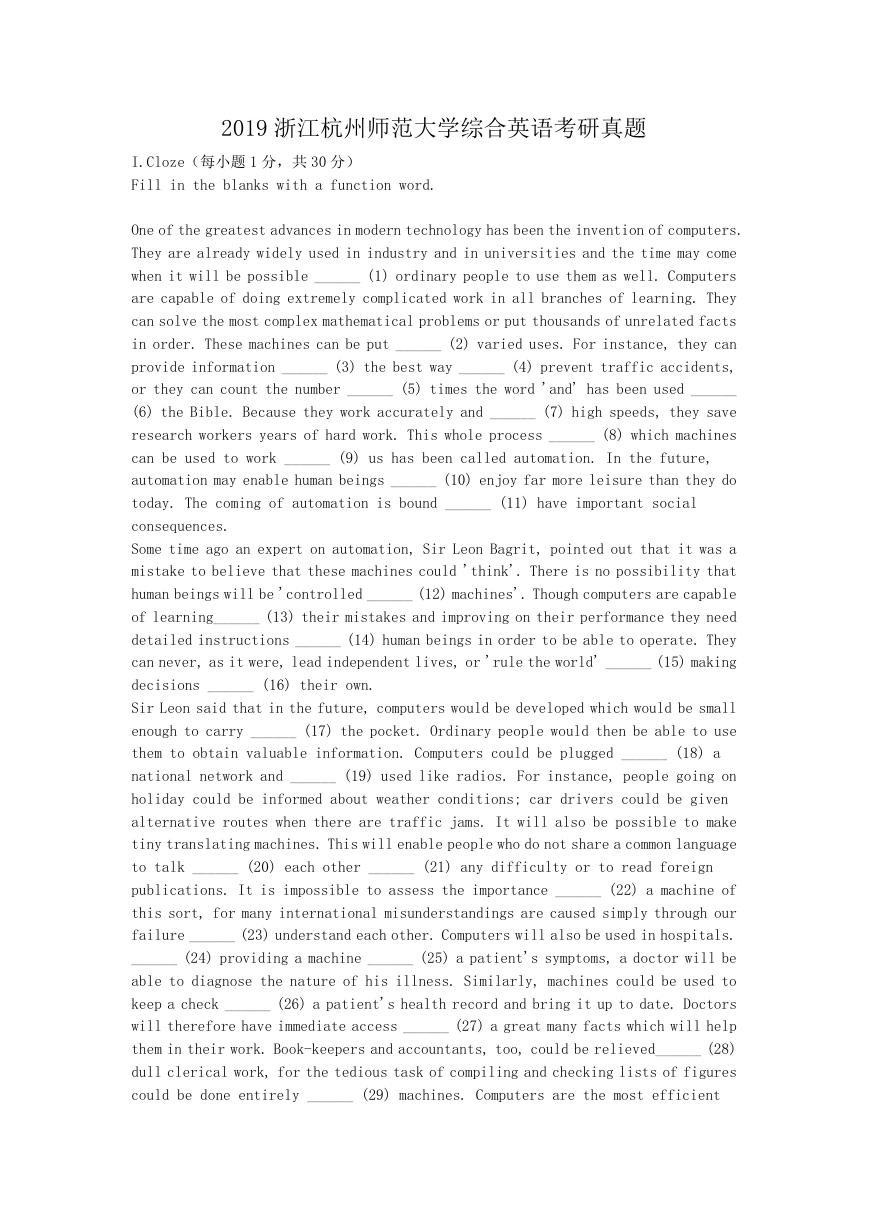
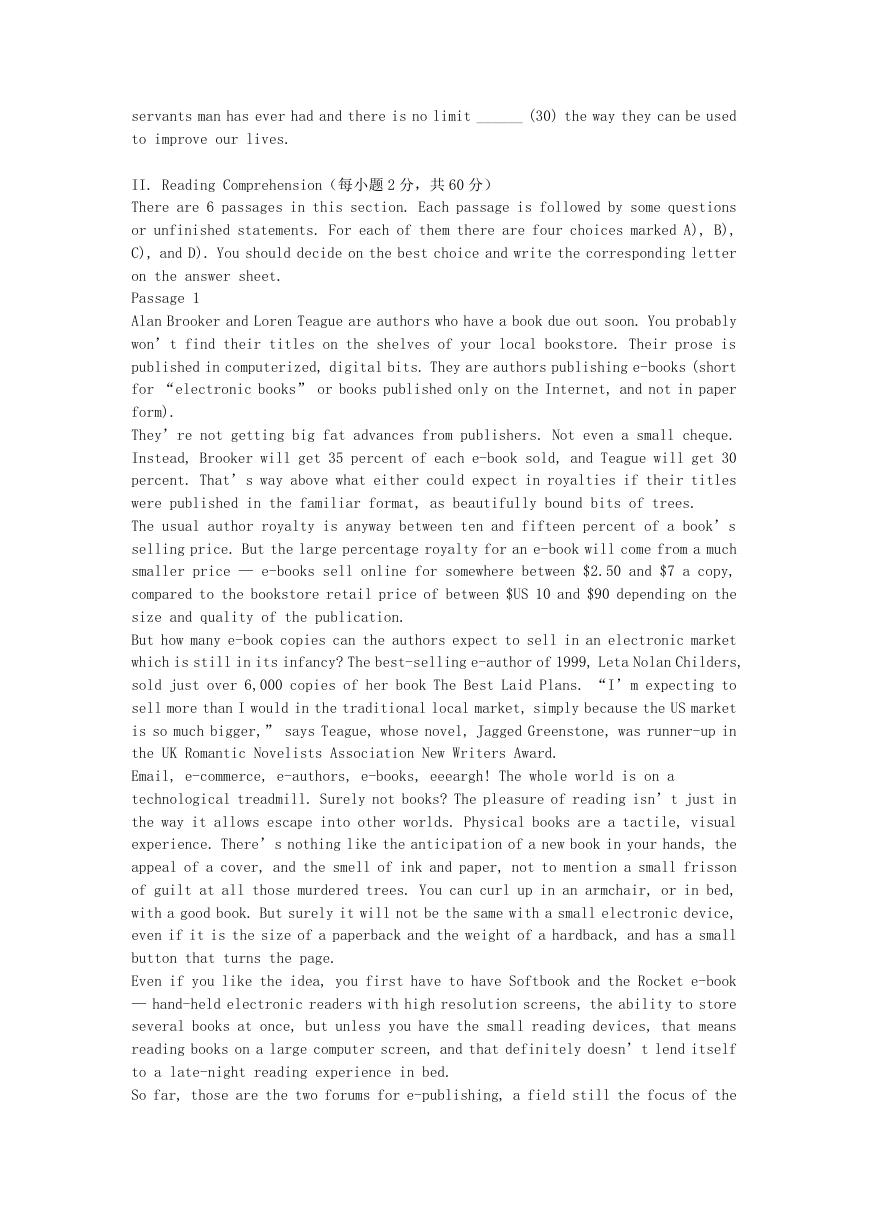
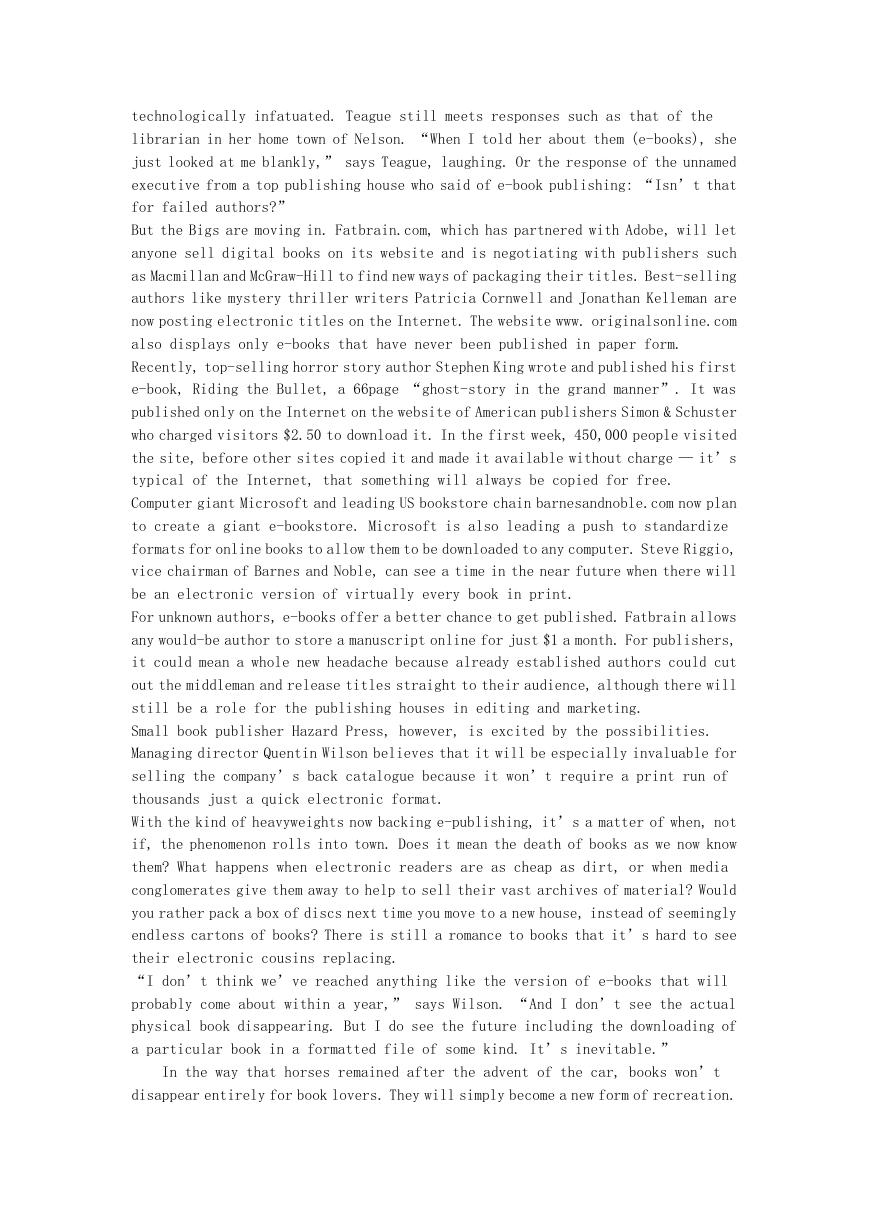
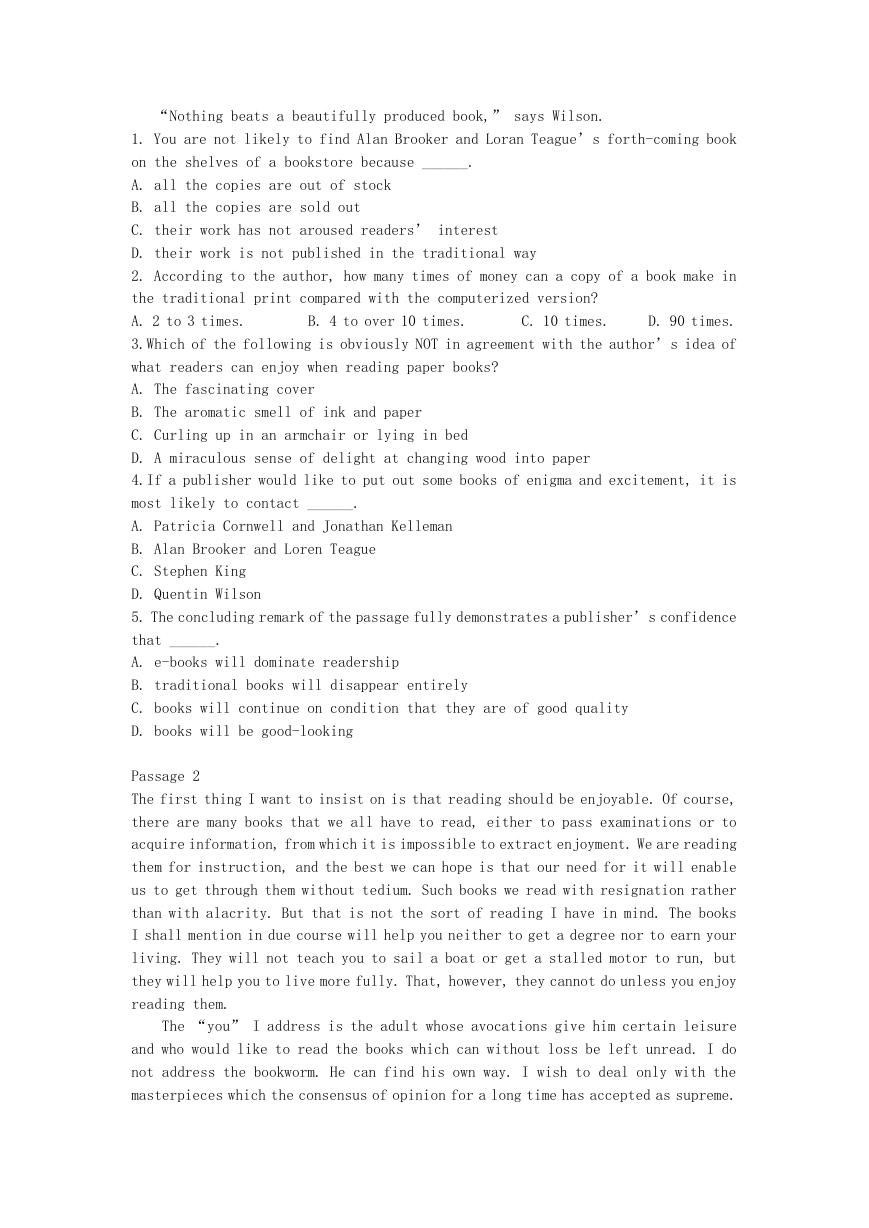
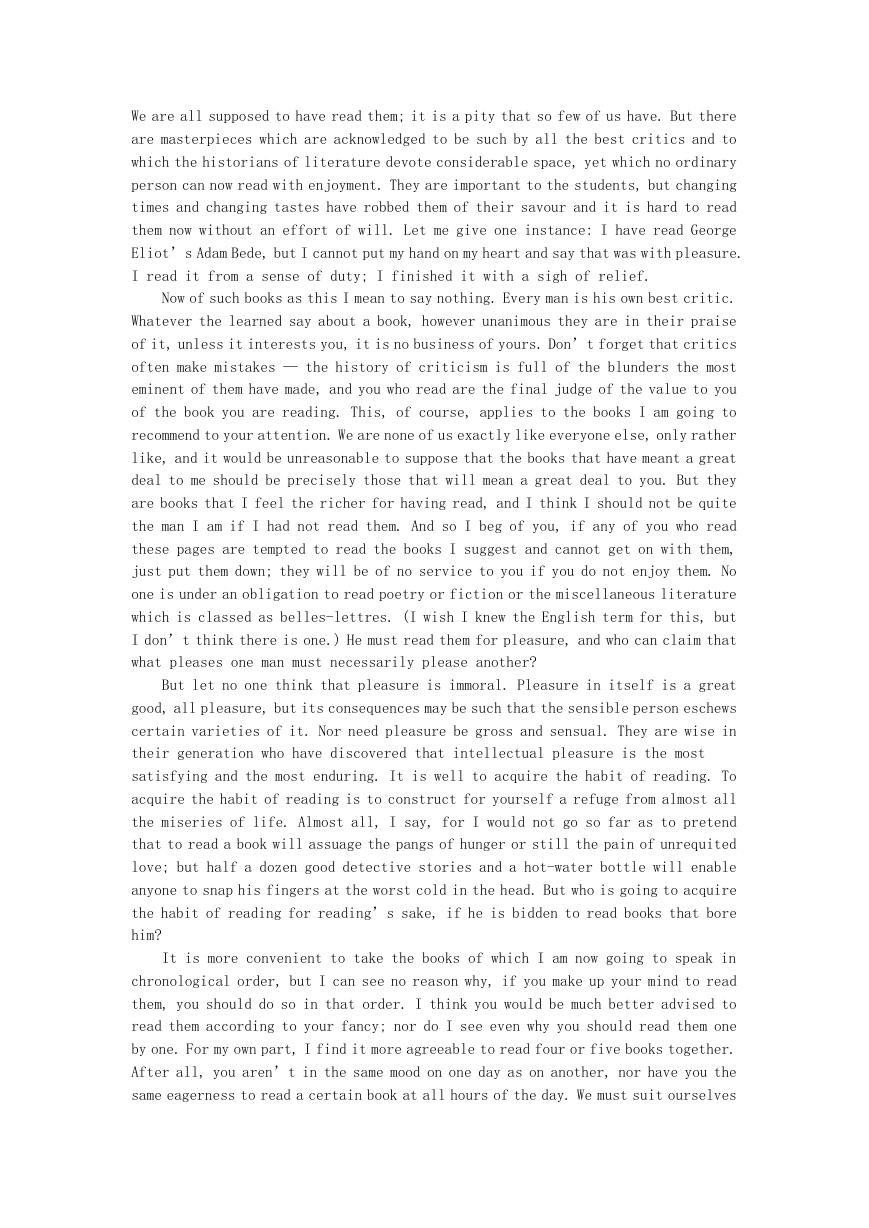

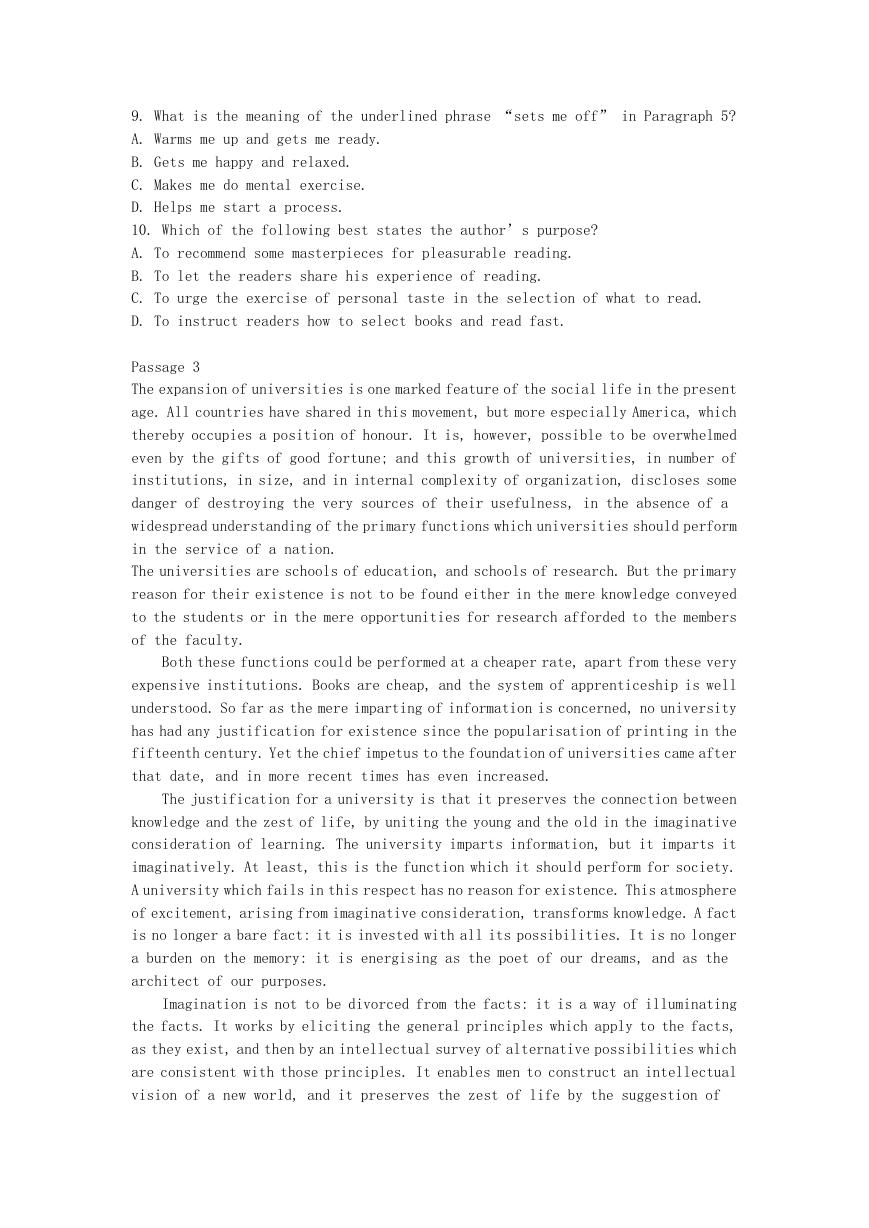
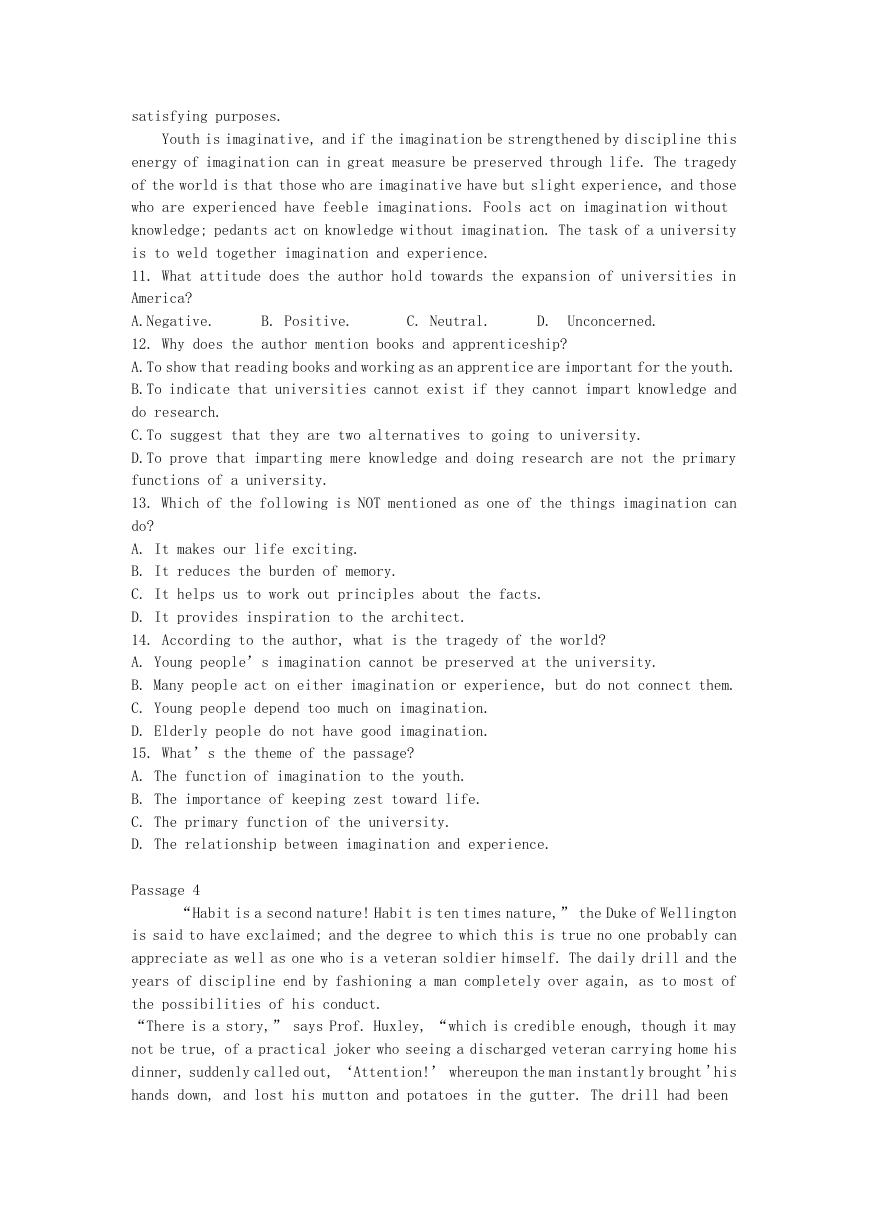








 2023年江西萍乡中考道德与法治真题及答案.doc
2023年江西萍乡中考道德与法治真题及答案.doc 2012年重庆南川中考生物真题及答案.doc
2012年重庆南川中考生物真题及答案.doc 2013年江西师范大学地理学综合及文艺理论基础考研真题.doc
2013年江西师范大学地理学综合及文艺理论基础考研真题.doc 2020年四川甘孜小升初语文真题及答案I卷.doc
2020年四川甘孜小升初语文真题及答案I卷.doc 2020年注册岩土工程师专业基础考试真题及答案.doc
2020年注册岩土工程师专业基础考试真题及答案.doc 2023-2024学年福建省厦门市九年级上学期数学月考试题及答案.doc
2023-2024学年福建省厦门市九年级上学期数学月考试题及答案.doc 2021-2022学年辽宁省沈阳市大东区九年级上学期语文期末试题及答案.doc
2021-2022学年辽宁省沈阳市大东区九年级上学期语文期末试题及答案.doc 2022-2023学年北京东城区初三第一学期物理期末试卷及答案.doc
2022-2023学年北京东城区初三第一学期物理期末试卷及答案.doc 2018上半年江西教师资格初中地理学科知识与教学能力真题及答案.doc
2018上半年江西教师资格初中地理学科知识与教学能力真题及答案.doc 2012年河北国家公务员申论考试真题及答案-省级.doc
2012年河北国家公务员申论考试真题及答案-省级.doc 2020-2021学年江苏省扬州市江都区邵樊片九年级上学期数学第一次质量检测试题及答案.doc
2020-2021学年江苏省扬州市江都区邵樊片九年级上学期数学第一次质量检测试题及答案.doc 2022下半年黑龙江教师资格证中学综合素质真题及答案.doc
2022下半年黑龙江教师资格证中学综合素质真题及答案.doc